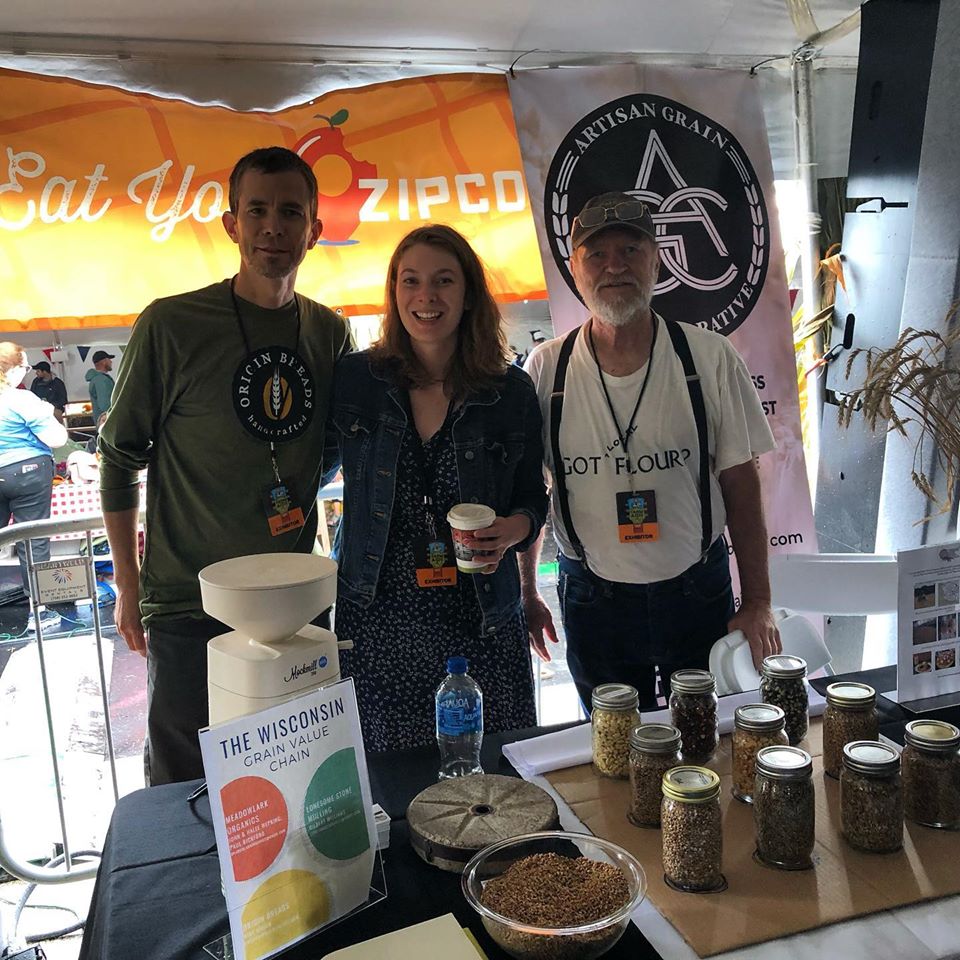July 13, 2020
To build a regenerative agricultural landscape in the Upper Midwest, says Alyssa Hartman MFALP’19, start small.
“Small grains,” which include barley, oats, rye, and wheat, are more petite than grains like corn and soy—and they can transform a farm. When planted in rotations between plantings of corn and soy, small grains reduce disease pressure and the need for artificial fertilizers and pesticides. Incorporating small grains improves the overall soil health and biodiversity of the farm ecosystem.
Despite the documented benefits of agricultural diversity and incorporation of small grains into row crops systems, most farmland in the Upper Midwest is still dominated by corn and soy. That’s why the Artisan Grain Collaborative (AGC) was founded in 2016—to help bolster markets for food-grade small grains that can be used locally in products like bread, pizza, beer, and spirits.
“For farmers to grow new or different crops, they need to know that they will have a place to sell them,” said Hartman, the organization’s executive director. “Our work is in connecting all the facets of our regional grain value chain—from farmer, to miller, to baker, or from farmer, to maltster, to brewer—to shore up relationships and create reliable markets to compete with commodity agriculture.”
Law and Policy for the Food System
Hartman’s drive to build a better food system predates her time at VLS, as she worked on small farms, with K-12 school meal programs, and in political and community organizing. “I found that many of the problems farmers faced—whether securing markets, sustaining the viability of their operations, or preserving natural resources—required policy-based solutions,” she said. “I wanted to understand how to improve upon existing food and agricultural policy frameworks and found VLS’s Master in Food and Agricultural Law and Policy program to be the most rooted in activism, social consciousness, and a land ethic of any of the options I considered.”
At VLS she dove into a range of food, agriculture, and environmental law and policy courses. She also co-hosted a weekly talk radio show with a local dairy farmer on Royalton Community Radio. Each week their discussions of milk and dairy policy were broadcast in the small towns surrounding Vermont Law School, an area with a deep dairying legacy.
During her final semester at VLS, Hartman enrolled in the Food and Agriculture Clinic, and worked with Farm to Institution New England to develop state policy snapshots and a summary report of policies in New England that incentivize institutional procurement of local food. “I found the clinic to be particularly beneficial,” she said. “It provided an invaluable experience to gain additional skills and work experience while maintaining the security of an engaged support system. The staff at the Center for Agriculture and Food Systems are experts in their fields and also wonderful people to work with and learn from.”

Homegrown Village.
A Better Small Grain Supply Chain
After graduating in 2019, Hartman moved to Madison, Wisconsin and was hired as the first full-time staff member and executive director of AGC. Since then, she’s been fostering connections with and between the farmers, millers, maltsters, bakers, chefs, brewers, distillers, agricultural researchers, affiliated nonprofits, and other individuals and organizations that make up the grain value chain. Hartman coordinates this group to identify and remedy gaps and obstacles, required to build a regional regenerative grainshed in the Upper Midwest.
Hartman has also been working to educate the public about what small grains are, why they matter, and the important role they play in the regional food system and environmental stewardship. To that end, Hartman has been a guest on a number of podcasts and radio segments, including the July 9 episode of Brattleboro-based Blue Flame Radio Hour, created and hosted by fellow alumna Ali Berlow MFALP’20.
When the COVID-19 pandemic emerged in March, Hartman became increasingly concerned about the farms and small businesses AGC supports, and also noticed bread shortages in nearby supermarkets and food pantries. “I had an idea,” she said. “What if we can create a system where bakeries are paid to produce bread for food pantries?” That thought grew into the Neighbor Loaves program: Bakeries offer loaves of bread made with at least 50 percent locally grown, stone-milled grain at the retail price points required to purchase local ingredients, pay staff a living wage, and keep their businesses afloat. Customers purchase these loaves as a donation, and bakeries produce and distribute the bread to community feeding organizations.
In three months, the Neighbor Loaves program grew from two bakeries in Madison to 20 bakeries throughout the region. So far, more than 10,000 Neighbor Loaves have been donated. In May, AGC adapted the program to include tortillerias using local corn, and allied groups in New England, Pennsylvania, and the DC metro area have expanded the program throughout the country.
“I feel more hopeful about this work than anything I’ve done in the past 10 years,” said Hartman. “We have an incredible opportunity to leverage small grains and other staple crops to simultaneously improve farmer livelihoods, reinvigorate rural communities, enhance the agricultural environment for public benefit, and connect eaters to locally produced nutritious food. The global supply chain disruptions we’ve seen throughout the pandemic have highlighted why regional resilience is essential.”
“In the Midwest,” Hartman added, “we’re laying the groundwork for a new agricultural system that feeds the soil, local economies, and our communities.”
